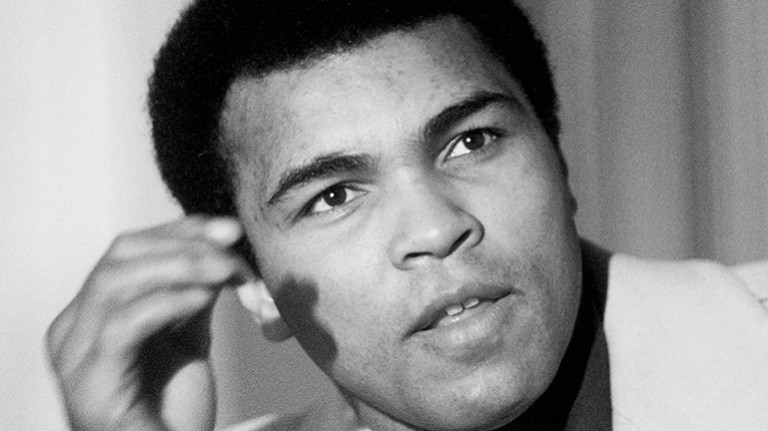
Muhammed Ali January 17, 1942 – June 3, 2016
The greatest sportsperson of the 20th Century (as voted by BBC viewers) died after a 30 plus year fight with Parkinson disease. Muhammed Ali defied discrimination, political manipulation, possible incarceration, financial corruption, and sporting death to help push human dignity for all and define a whole generation as a world leader.
Born in a segregated world, he first came to prominence when he won a gold medal at the Rome Olympics in 1962. When he came back to the USA he was refused service in a diner, and, this led him down the road to fight for civil rights. He threw away the gold medal as worthless if he can win this for his country and still be treated as a sub human being.
His ability to create publicity by being a bombastic showboater endeared him to many, but, led to passionate hatred among those who didn’t like to see and hear a black man boasting about his prowess. As a driver of ticket sales it was perfect. Many came to see him fight and lose as to watch him fight and win.
When he became a professional fighter he also became interested in Islam and particularly the Nation of Islam which was a very political organisation and aimed to free people from grip of oppression. He announced his conversion after beating Sonny Liston who was once seen as unbeatable.
Many people in authority refused to accept that Muhammed Ali had changed his name from Cassius Clay to Muhammed Ali and in interviews and other news item you could see the struggle he would have with people still calling him Cassius Clay while Muhammed Ali constantly having to correct them by saying his name was Muhammed Ali.
His political activism came to a head when he refused to be drafted to fight in the Vietnam War by saying ”My conscience won’t let me go shoot my brother, or some darker people, or some poor hungry people in the mud for big powerful America. And shoot them for what? They never called me nigger, they never lynched me, they didn’t put no dogs on me, they didn’t rob me of my nationality, rape and kill my mother and father. … Shoot them for what? How can I shoot them poor people? Just take me to jail.”
This defiance was unbearable for the authorities and Muhammed Ali was stripped of his boxing titles and banned from boxing which was his career. For three years he defied the government and after the embarrassment of the failure of American foreign policy the Supreme Court created a way for the authorities to allow Muhammed Ali to continue with his career, thinking that the three year hiatus would have finished him. His strife with the establishment can be seen in greater light that Dick Cheney, Dan Quayle, Bill Clinton, George W Bush, Mitt Romney and Donald Trump never served in Vietnam yet were somehow treated lightly.
Not only did Muhammed Ali came back but he went on to be a great ambassador for the sport with fights known by their title such as “Fight of the Century” with Joe Frazier in 1971 in which Ali lost, “The Rumble in the Jungle” 1974 with George Foreman in which Ali won using the tactic he called ‘Rope the dope’, and, finally Thriller of Manila again with Joe Frazier in which he won but later claimed it “was the closest thing to dying that I know”.
This forged him as a legend and a world wide figure comparable to the stature of Queen Elizabeth II or Mao Tse Tung. However, after these major fights there began the problems with his health. He suffered defeat to Holmes and Birbick and finally retired and then was diagnosed with Parkinson Disease which led to his greatest fight yet.
As he battled with the disease he began to get more frail and when he opened the Atlantic Games in 1996, his shaking arm was testament to how far his health deteriorated, when he lit the flame. He turned his hand to being a peace missionary and tried to help negotiate in difficult situations and rescue hostages. But, in the end Muhammed Ali showed the world that strong morals, believing in a situation that will give everyone a better life and refusing to give in to hypocritical power is the best way to live.
Muhammed Ali died after respiratory problems.

